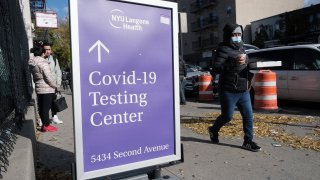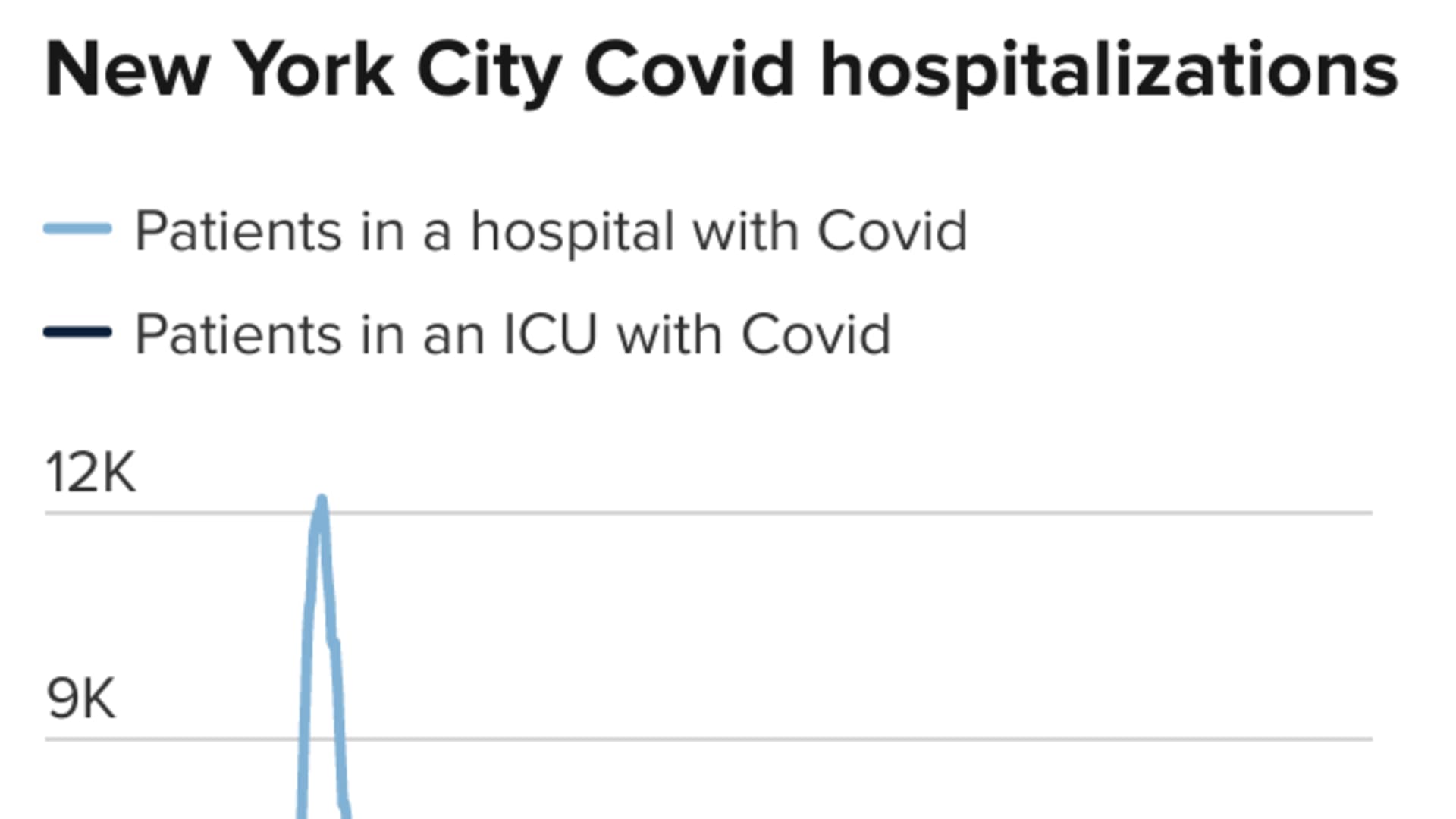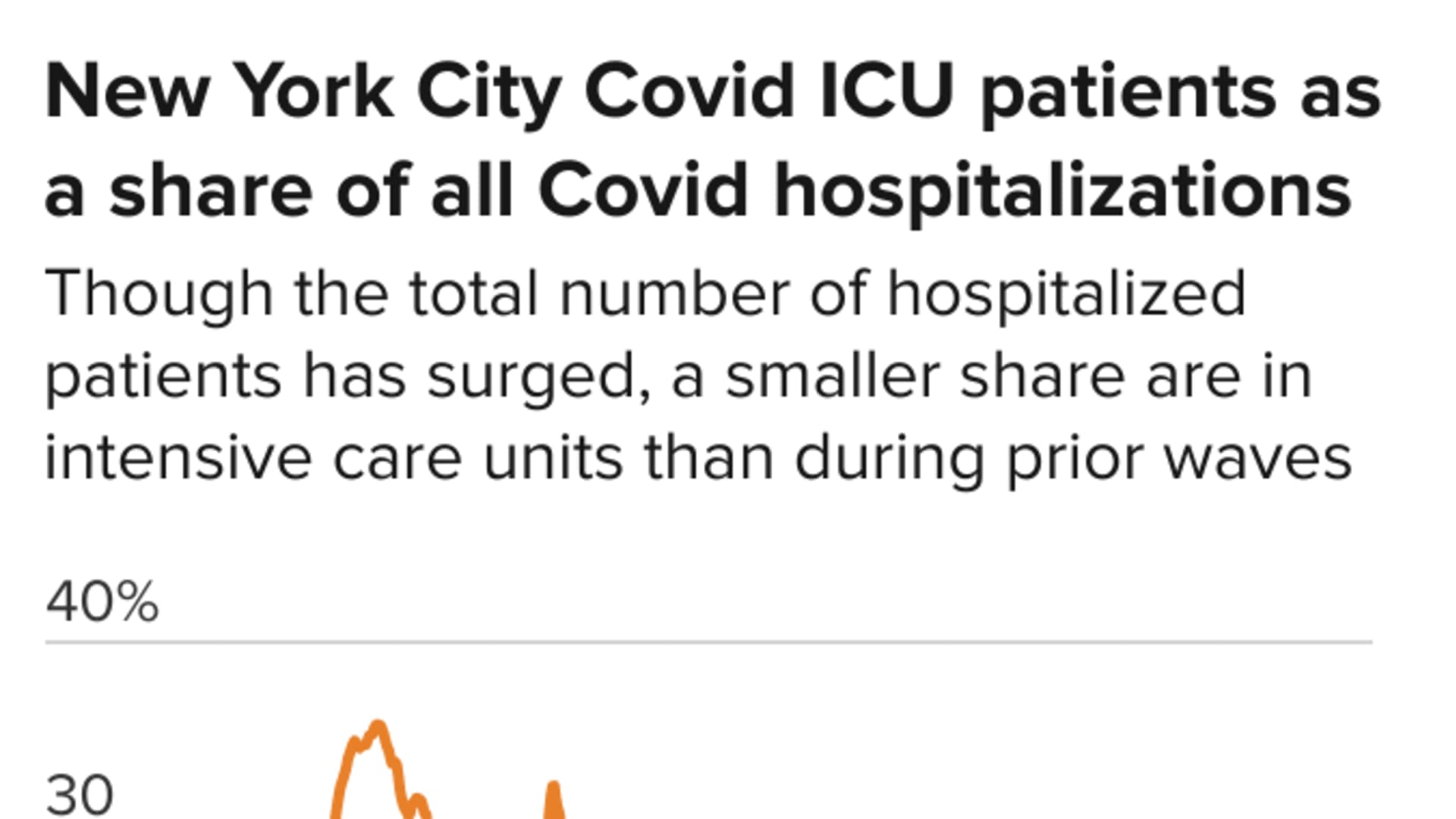
A sign outside of a hospital advertises COVID-19 testing on November 19, 2021 in New York City. On Friday vaccine advisers to the US Centers for Disease Control (CDC) and Prevention voted unanimously in recommending a booster shot of the COVID-19 vaccines for all adults in the United States six months after they finish their first two doses.
- The number of New Yorkers in hospitals with Covid-19 is surging, but fewer are in the ICU than previous waves.
- About 11% of all Covid patients in New York City hospitals are in the ICU, compared with 17% during prior waves.
- The overall volume of patients combined with staffing shortages means that hospitals can still feel pressure from the sharp spike in Covid-positive patients.

The number of New Yorkers in the hospital with Covid-19 is surging, but fewer of them are ending up in intensive care compared with prior waves — a sign that vaccines and the potentially milder omicron variant are making people less sick.
About 5,900 patients are hospitalized with Covid-19 across New York City, 52% higher than last winter's peak of nearly 3,900 reached on Feb. 8, state data through Wednesday shows. The 666 patients currently in ICUs with Covid, however, remain below last winter's high mark of 773.
Get Tri-state area news delivered to your inbox. Sign up for NBC New York's News Headlines newsletter.
New York, where cases have been surging to record levels for weeks, has emerged as the epicenter of the country's omicron wave. Survival rates there are being closely watched as a potential indication of what may happen around the country as the variant, which is now the dominant strain nationwide, takes further hold in other places.
Dr. Adel Bassily-Marcus, an ICU specialist at Mount Sinai Hospital in Manhattan, said his unit is operating "close to normal" even as the number of patients testing positive for the virus has significantly risen over the past month.
"We have an increasing number of ICU patients, but nowhere near what we saw in the first wave," he said. "It has increased to a lesser extent than the total number of hospitalizations."
Money Report
High vaccination rates in the area are keeping people from getting really sick, Bassily-Marcus suggested. The omicron variant itself may also be less virulent than previous strains, he said, helping to keep ICU visits down. Those who do end up in Mount Sinai's ICU are typically either unvaccinated or have underlying conditions that make them more prone to serious illness, he said.
Of the more than 1,500 patients with Covid in one of Northwell Health's 22 hospitals across the greater New York City area, 9% are in the ICU, according to spokeperson Joe Kemp. That figure was at 16% when Northwell was handling a similar number of Covid patients at this time last year.
One reason for the larger disconnect between hospitalized and ICU patients is the rising number of people who, due to the high level of viral transmission in the city, enter a hospital for something other than Covid and test positive once admitted. Kemp said about 40% of Northwell's 1,500 Covid patients fall into that category.
At NYU Langone Health, about 65% of the patients with Covid came to the hospital for something else, spokesperson Lisa Greiner told CNBC in an email, adding that the number of patients being admitted to the ICU for Covid is down 58% from January 2021 levels.
About 10% of the 1,000 Covid patients within the 10 campuses of the NewYork-Presbyterian hospital system are in the ICU, spokesperson Maxine Mitchell-Ramsay told CNBC in an email. That compares with 20% of the 700 Covid patients they had at this time last year. Slightly less than half of the system's current Covid patients were hospitalized for something other than the virus and tested positive in the hospital.
Citywide, the percentage of hospitalized Covid patients in ICUs is about 11%, according to a CNBC analysis of state data. During prior waves, it never fell below 17%.

Hospitals can still feel pressure from the sharp spike in Covid-positive patients despite the fact that some are less sick than before.
"Even if you're having a lot of people that don't require ICU-level care, it still does stress the system," said Dr. Bruce Y. Lee, a professor of health policy and management at the City University of New York School of Public Health. Hospitals still need to isolate these patients so they don't infect others, and an increase in the overall volume of hospitalized people means an already exhausted workforce is being stretched even further.
Many hospital workers are also being forced to quarantine after getting Covid themselves. Kemp said that about 3% of Northwell's 78,000-person workforce is currently out sick, but that the system has managed by redeploying staff across departments and calling on workers from an internal temp agency. Bassily-Marcus said that staffing challenges at Mount Sinai are more significant than during earlier waves because of omicron's infectiousness.
"We are managing it because we are used to it," he said. "We know how to deal with staff shortages."
The combination of staffing shortages and the rising overall patient level is "something for us to take seriously," New York City Health Commissioner Dave Chokshi said at a news conference at Elmhurst Hospital in Queens on Wednesday, even if those in ICU are making up a smaller share of the total.
"What we know is that Covid-19 hospitalizations are increasing." he said. "The degree of severity is somewhat less than what we have seen in prior waves, but we are seeing ICU hospitalizations increase as well."






